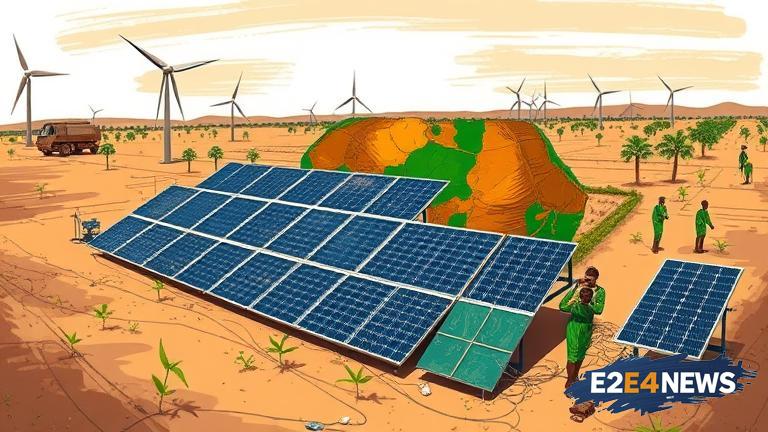The African continent is witnessing a significant shift towards renewable energy, driven by the need to address the pressing issues of energy access, climate change, and sustainable development. With many countries still struggling to provide reliable and affordable electricity to their citizens, renewable energy has emerged as a viable solution. Solar and wind power are leading the charge, with countries like South Africa, Egypt, and Morocco investing heavily in these sectors. The African Union’s ambitious goal of achieving 100% access to electricity by 2030 has further accelerated the adoption of renewable energy. Governments and private sector companies are working together to develop large-scale renewable energy projects, creating new opportunities for economic growth and job creation. The use of renewable energy is also expected to reduce greenhouse gas emissions, contributing to a cleaner and healthier environment. Moreover, the cost of renewable energy is decreasing, making it more competitive with fossil fuels. This trend is likely to continue, with the International Energy Agency (IEA) predicting that renewable energy will account for 60% of the world’s power generation by 2050. In addition to solar and wind power, other forms of renewable energy such as hydro, geothermal, and biomass are also being explored. The development of renewable energy infrastructure is also driving innovation, with new technologies and business models emerging to support the growth of the sector. For instance, pay-as-you-go solar home systems are becoming increasingly popular, allowing low-income households to access electricity for the first time. Furthermore, renewable energy is creating new opportunities for women and youth, who are often at the forefront of community-based renewable energy initiatives. The growth of renewable energy is also attracting international investment, with companies from around the world looking to tap into Africa’s vast renewable energy potential. However, despite the progress made, there are still significant challenges to be addressed, including the need for greater investment in energy storage and grid infrastructure. Moreover, the integration of renewable energy into the existing energy mix will require careful planning and coordination. Nevertheless, the future of renewable energy in Africa looks bright, with the potential to transform the continent’s energy landscape and drive sustainable development. As the world transitions towards a low-carbon economy, Africa is well-positioned to play a leading role in the global renewable energy market. With its abundant natural resources and growing demand for energy, the continent is poised to become a major player in the production and deployment of renewable energy technologies. The African renewable energy market is expected to continue growing, driven by government policies and regulations, declining technology costs, and increasing demand for clean energy. In conclusion, the renewable energy revolution in Africa is gaining momentum, driven by a combination of factors including government support, private sector investment, and declining technology costs. As the continent continues to transition towards a low-carbon economy, renewable energy is likely to play an increasingly important role in driving sustainable development and reducing dependence on fossil fuels.





